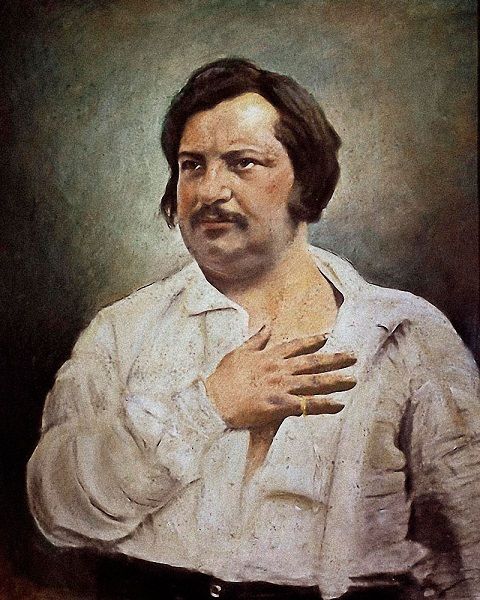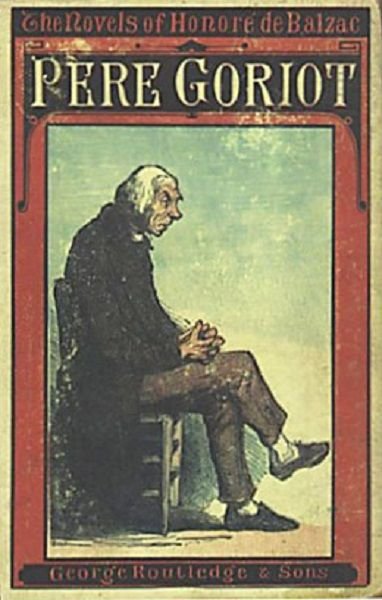Père Goriot / Father Goriot by Honoré de Balzac
The french literature has its own history, which reflects the realities of France in the first half of the nineteenth century. The works of Flaubert, Gi de Mopassan, Stendhal and Balzac turn into a psychologically motivated and true picture of the public life. As part of Human Comedy, Honoré de Balzac's "Father Goriot" novel is a realistic picture of its time, because it reveals human habits and how the human person is demoralized by the social environment.

The painting of the time is represented by the diminutive model of the society that inhabits the Voche board, through the characters living in it, through the conflict between man's eternal striving for a better life and the necessity in the depicted time to be attained at the cost of his moral fall. Events and images are typical of a society whose passions and ambitions are subject only to a peculiar deity - the money. To create the picture of his time, the author draws a "list of vices and virtues" of the society in which he lives. The story of "Father Gorio" has as its basis a human destiny, which is entirely dependent on one human passion. This is the fatherly love - devoted, infinite and obsessive. This passion is opposed to the noble and lofty feelings of a Parisian society, whose most valuable value and meaning of existence is money and personal prosperity through them. Elder Gorio's drama evolves against the background of human relationships, predetermined by money and material wealth. Balzac manages to convey the essence of the Parisian society, from its lowest to the highest levels, not only lifting the curtain, but also shifting the scenery to reveal clearly to the reader the actual picture and real faces of the people. The leading motif in the novel is riches at the cost of everything: neglect of moral norms, abandonment of dream ideals.
The displayed human relationships and behaviors of the characters are clear and consistent, especially with regard to the goals they pursue in their lives. An example of this is the life of Countess de Resto, Baroness Noussianján and Viccontes de Bossane. The exposition of the novel introduces the reader into a particular environment and directs the upcoming drama. The author makes a study of society as an impact on individual situations, thus paying attention to their past, which is the key to their actions and relationships. The writer not only creates a real idea of his characters, but also portrays their social affiliation, describing the place they occupy. From it, the smell of "the smell of a board", which is a mixture of spattered air, mildew, lime, from it they get cold chills, there is something sticky in it that irritates and penetrates the clothes ... ". All this lies behind the benevolent appearance and claims of the occupants of the boarding house. Every one of them is remembered with some characteristic detail in the appearance or in his accessories, expressing the human nature and the social situation. Through grotesque, the author identifies himself as a moral historian, reproaches malice and vices. In the image of Father Goriot they are united in a typical image of enterprising bourgeois, rich in wealth, and a father conquered by a maniacal passion - to give his beloved daughters everything to live happily and in splendor.

As typical of his time as an example of an ordinary worker who has become wealthy after talks and speculation after the revolution, so Goriot is atypical in his behavior as a parent who is ready for all sacrifice in the name of his children. It is the foolish fatherly love that causes his terrible misfortune, his complete destruction, misery and premature death. His infinite love remains unencumbered in the hearts of his daughters - Anastasie de Resto and Delfin de Nussignan. They have room for money only. They remain imprisoned and cold for his soul anguish and vain hopes of seeing them before he leaves this world forever. The living drama of the former artist provokes the reader to reflect on the moral-ethical dimensions of human relations. They become clearer in the conversations and behavior of the characters, discovering the psychological motives that guide them. The old man has a circular "like simple onion face," and his gradual and spiritual degradation is symbolically shown by his move from the nicest room of the boarding house to the most miserable room on the maisonette where he dies lonely and rejected by his family. Faithful to the objective image inherent in realism, Balzac shows the events from different points of view - the attitude of those living in the boarding house to the fate of Father Goriot, mocked by him, the attitude of his daughters and their spouses, the comments in the higher society. The old man later realizes that he is personally guilty of his misfortune and that "money gives everything to man, even his daughters." The father's reckoning of his children is terribly sad: "I totally redeemed my sin that I love them too much. They totally avenged me for my love, tortured me like executioners. " According to the moral of the Paris society, everything is measured with money and influence.
The image of Eugene Rastiniak also complements the picture of reality. Still sensitive to human suffering, the only one cares about the sick and dying old man. At the same time, however, he intensively studied the paths of elevation in the higher society, and thoroughly assimilated the lessons of Countess Boissen: "How much sleeping more coldly, calculating, the further you will reach" The law student understands that the cost of success he has to pay is clearly defined and if it wants to rise, there is no other choice. And the life philosophy of former Prisoner Votren affirms the right of the stronger, the treacherous predator, who serves deception, unfair corruption or crime to reach the covenant goal: "The man is imperfect. He is more or less a hypocrite, and fools say he is moral or immoral. "
In his novel, "Father Goriot", Balzac uses contrasts as a means of opposing different social groups, human characters and individual details in the image of the characters or the setting in which the action takes place. The main themes of the work are fatherly love, the ambition to rise in society are united into one whole and subordinate to clarifying the history of manners. They create a full-blown picture of time, but also point to meaningful insights into the essence of social and moral dimensions in human relationships.
Man's nature is not essentially evil. Brute nature has been known to yield to the influence of love. You must never despair of human nature.
- Mahatma Gandhi
:)
This post has received gratitude of 25.82 % from @appreciator thanks to: @godflesh.